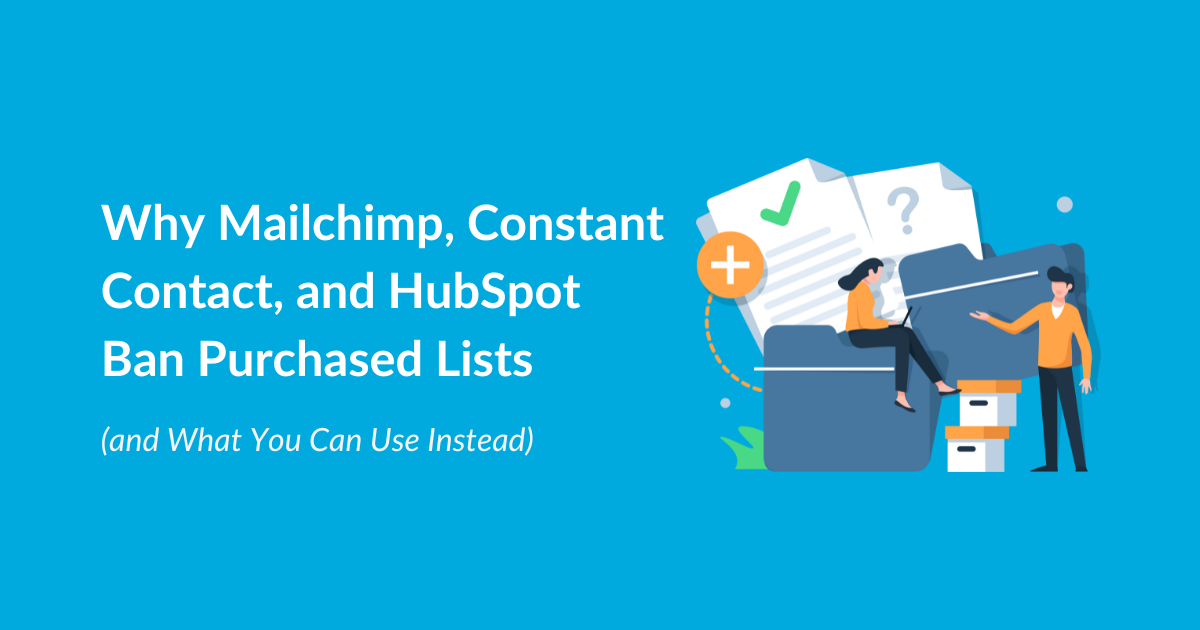
Written by MailClickConvert
Last updated: July 29, 2025
Email marketing platforms like Mailchimp, Constant Contact, and HubSpot dominate the market for newsletters and automated campaigns. But if you’ve ever tried uploading a purchased email list to one of these platforms, you probably hit a wall—or worse, got banned.
So what’s going on? Why are these popular tools so strict about purchased contacts? And what are your options if you do want to send bulk emails to a list you legally bought?
Let’s break it down.
Why Do Mailchimp, HubSpot, and Constant Contact Ban Purchased Lists?
The short version: they’re permission-based platforms.
These companies built their businesses on helping brands send marketing emails to *opted-in* subscribers—people who explicitly said “yes” to receiving emails from you.
1. It’s baked into their terms
Here’s what each platform says about purchased or third-party lists:
- Mailchimp: “We don’t allow purchased, rented, or third-party lists.” Violation = account suspension or permanent ban.
- Constant Contact: Prohibits any list that wasn’t directly collected by you through permission-based methods.
- HubSpot: Disallows purchased or scraped email addresses entirely.
They’re serious about it—and they enforce it.
2. They’re protecting their sending reputation
Mailchimp and similar platforms use shared IP pools.
If one user sends spam, it can hurt deliverability for everyone. So they restrict high-risk practices (like using cold or purchased data) to keep overall deliverability clean.
3. They’re optimized for opt-in funnels
These platforms offer segmentation, automations, and scoring—but only work well when your list is engaged.
A cold list (with low open rates or high bounce/complaint rates) breaks their system—and could cause deliverability issues across their network.
But… Are Purchased Email Lists Illegal?
No, not in the U.S.
Under CAN-SPAM, you can legally email people you haven’t interacted with, as long as you follow the rules:
- Include a clear opt-out/unsubscribe
- Don’t use deceptive headers or subject lines
- Provide a physical mailing address
What gets people in trouble isn’t buying the list...it’s using it badly (e.g. blasting spam, not cleaning the list, or hiding unsubscribe links).
So while it’s not illegal, it’s also not supported by most mainstream ESPs.
What Happens If You Try Anyway?
Here’s what typically happens if you upload a purchased list to a platform like Mailchimp:
- Your campaign gets flagged or blocked
- Your account gets reviewed
- You’re asked for proof of consent
- You get banned
Even if a few emails slip through, the risk isn’t worth it. You’ll damage your sender reputation fast—and maybe lose access to the platform altogether.
What Should You Use Instead?
If you’re emailing third-party data (like a purchased list), you need a tool that’s built for cold email at scale.
That’s where we come in.
✅ Use a cold email platform like MailClickConvert
MailClickConvert is purpose-built for sending to purchased lists - legally and effectively.
We give you:
- Dedicated IPs and domains (so you don’t ruin your main domain)
- CAN-SPAM compliant campaigns (with built-in opt-out links)
- Email validation and list cleaning on upload
- High-volume sending infrastructure tuned for cold outreach
- Analytics and A/B testing to optimize deliverability and response
We’re not another newsletter tool. We’re a bulk cold email platform designed for sales teams, lead gen agencies, and B2B marketers who use third-party data to grow pipeline.
Key Differences (at a Glance)
Final Thoughts
If you’ve been burned by Mailchimp, Constant Contact, or HubSpot for uploading a purchased list, you’re not alone. These tools weren’t built for cold email.
But cold outreach is still a powerful way to generate leads, if you do it right.
That’s where MailClickConvert gives you the edge: our infrastructure, compliance tools, and deliverability features are purpose-built for B2B cold email at scale.
👏 Ready to legally send to a purchased list?
Try MailClickConvert today and turn cold contacts into warm leads.
- Log in to post comments

